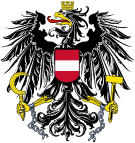
Early parliamentary elections were held in Austria on 24 November 2002, after internal divisions in the Freedom Party of Austria (FPÖ) culminating in the Knittelfeld Putsch led to the resignation of several leading FPÖ members. The result was a victory for the ÖVP, which won 79 of the 183 seats, the first time it had been the largest party in the National Council since 1966. It continued its coalition government with the FPÖ, which had lost almost two-thirds of its seats. Voter turnout was 84.3%.

Parliamentary elections were held in Austria on 3 October 1999.

Parliamentary elections were held in Austria on 1 March 1970. The result was a victory for the Socialist Party, which won 81 of the 165 seats to become the largest party for the first time in the Second Republic, only two seats short of a majority. Bruno Kreisky of the Social Democrats became Chancellor at the head of a minority government that was tolerated by the Freedom Party of Austria in return for electoral reform that favoured smaller parties. Voter turnout was 91.8%. It was the first Socialist-led government since 1920, and the first purely left-wing government in Austrian history.
A referendum on the Order law was held in Luxembourg on 6 June 1937. Voters were asked whether they approved of the new law, which would ban any political party that sought to change the constitution or national legislation by violence or threats. The law would result in the dissolution of the Communist Party, and became known as the Maulkuerfgesetz.
Elections to the Supreme Soviet were held in the Soviet Union on 4 March 1984. They were the last in the Soviet Union to be held before Mikhail Gorbachev's policies of perestroika and demokratizatsiya resulted in partially free elections in 1989. They were also the last direct elections to the Supreme Soviet, as in 1989 deputies were elected to the Congress of People's Deputies, who then elected the Supreme Soviet.
Elections to the Supreme Soviet were held in the Soviet Union on 14 June 1970.
Elections to the Supreme Soviet were held in the Soviet Union on 12 June 1966.
Elections to the Supreme Soviet were held in the Soviet Union on 12 March 1950.
Elections to the Supreme Soviet were held in the Soviet Union on 14 March 1954.
Elections to the Supreme Soviet were held in the Soviet Union on 16 March 1958.
Elections to the Supreme Soviet were held in the Soviet Union on 18 March 1962.
Elections to the Supreme Soviet were held in the Soviet Union on 16 June 1974.
Elections to the Supreme Soviet were held in the Soviet Union on 4 March 1979.

A referendum on the use of nuclear power was held in Austria on 5 November 1978. Voters were asked whether they approve a law allowing the peaceful use of nuclear power, particularly relating to the start-up of the Zwentendorf Nuclear Power Plant. Voters narrowly rejected it, with 50.5% voting against. As a result, although the Power Plant was finished, it was never operated and has since been dismantled.

A seven-part referendum was held in Italy on 21 May 2000. Voters were asked whether they approved of the repealing of laws on topics including election funding, the electoral system, the judiciary, employment and union dues. Although all but one of the seven proposals were approved by voters, the voter turnout of 32% was well below the 50% threshold and the results were invalidated.
A two-part referendum was held in Switzerland on 23 May 1875. A new federal law establishing and certifying civil status and marriage was narrowly approved, whilst a new federal law on suffrage was narrowly rejected.
Ten referendums were held in Switzerland in 1976. The first two were held on 21 March on popular initiatives "for employees' participation", and "for taxation reform". The next three were held on 13 June on a federal law on spatial planning (rejected), a CHF 200 million loan to the International Development Association (rejected), and renewing unemployment insurance (approved).
Eleven referendums were held in Switzerland during 2001. The first three were held on 4 March on popular initiatives on joining the European Union, lowering medicine prices and lowering the urban speed limit to 30 km/h in most places. All three were rejected by voters. The next three referendums were held on 10 June on two separate amendments to the federal law on the Swiss army and on a federal resolution on abolishing the requirement for a permit to establish a diocese, all of which were approved.
Fifteen referendums were held in Switzerland during 1992. The first two were held on 16 February on popular initiatives "for a financially bearable health insurance" and "for the drastic and stepwise limitation of animal experiments." Both were rejected by voters. The next seven were held on 17 May on joining and contributing to the Bretton Woods system, a federal law on water protection (approved), a popular initiative "for the recovery of our waters" (rejected), a federal resolution on the popular initiative "against the malpractice of gene technology on humans" (approved), a federal resolution on creating a civilian service alternative to military service (approved) and a change to the Strafgesetzbuch and the Military Penal Code on sexual integrity (approved).
Fifteen referendums were held in Switzerland during 2000. The first five were held on 12 March on reforming the judiciary and four popular initiatives; "for speeding up direct democracy ", "for a just representation of women in federal authorities", "for the protection of men against manipulations in procreation technology" and one to reduce motorised road by 50%. Whilst the judiciary reform was approved, all four popular initiatives were rejected. The next referendum was held on 21 May to authorise sectoral agreements between Switzerland and the European Union, and was approved by around two-thirds of voters.









